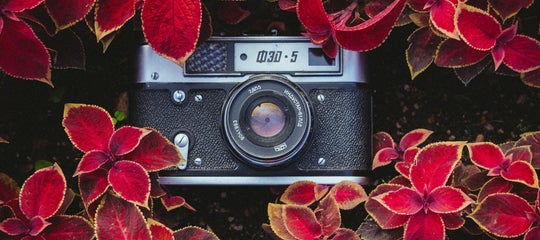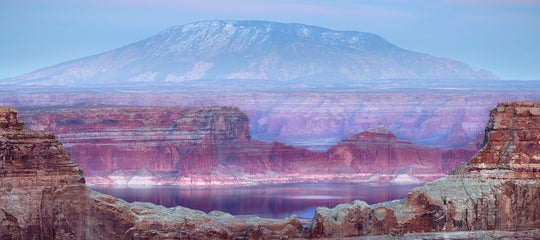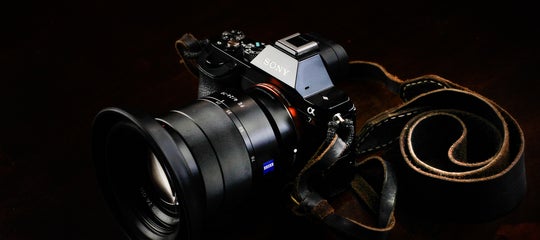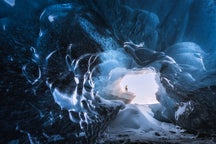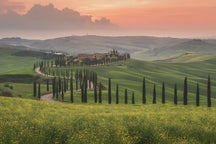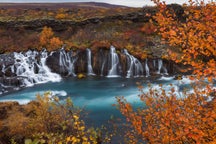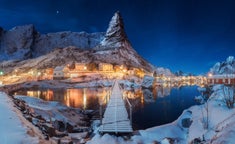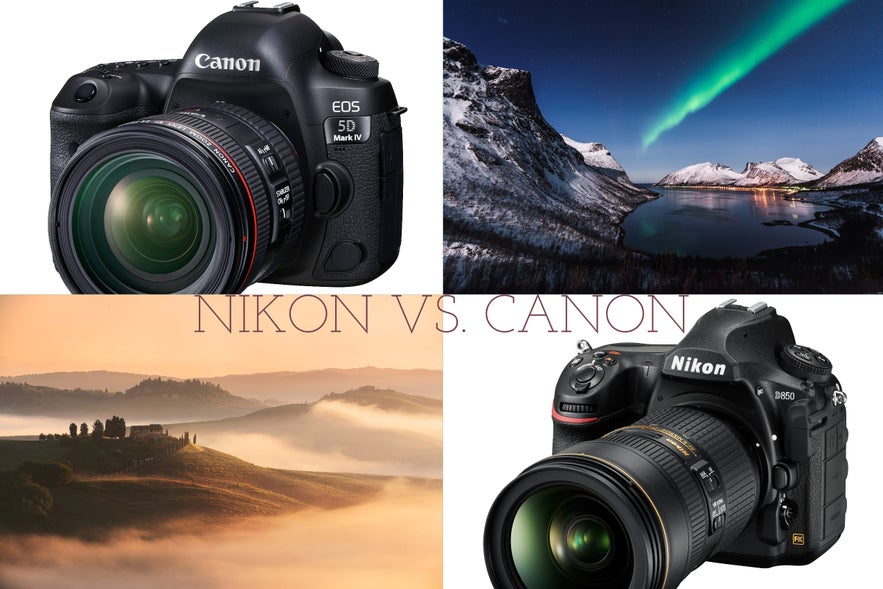
It is a longstanding “duel” that we are all aware of and which may have begun well before some of today's photographers were even born. Nikon and Canon have always been the most important names (if not the most of them all!) on the photography market. Over the decades, these two camera brands have been in a neck-to-neck battle for the throne, seeking to be crowned the leading manufacturer of the best cameras and lenses.
- Check out these Camera & Gear Reviews
- Get your free Beginner's Guide to Camera Settings
- Discover the Best Lenses for Night Photography
As you've probably already read a bunch of times around the web, it’s not really the camera that makes a photographer good or bad but sometimes, we can all agree that it’s useful to have reliable tools when you are working out in the field.
If you already possess some pieces of gear from one of the two brands, then I would never bother to jump ship, as differences in terms of performance won’t be life-changing for 99.9% of photographers. On the other hand, if you are just starting out, then you might want to know which brand is in the lead at the moment. Getting some good advice will help you to decide where it’s wiser to spend your money, depending on what kind of photography you would like to do.
- See also: The Best Camera Bags for 2020
A Brief History of the Nikon vs Canon Debate
Both Canon and Nikon have a long history, with both companies being conceived in the first half of the last century.
Nikon was born in 1917 as a result of the merger of three other companies operating in the optical sector. When I say “optical sector”, I do not mean only cameras and lenses (actually, at first Nikon wasn’t even producing any cameras!). I’m also talking about inspection equipment, binocular, measurement instruments and rifle scopes.
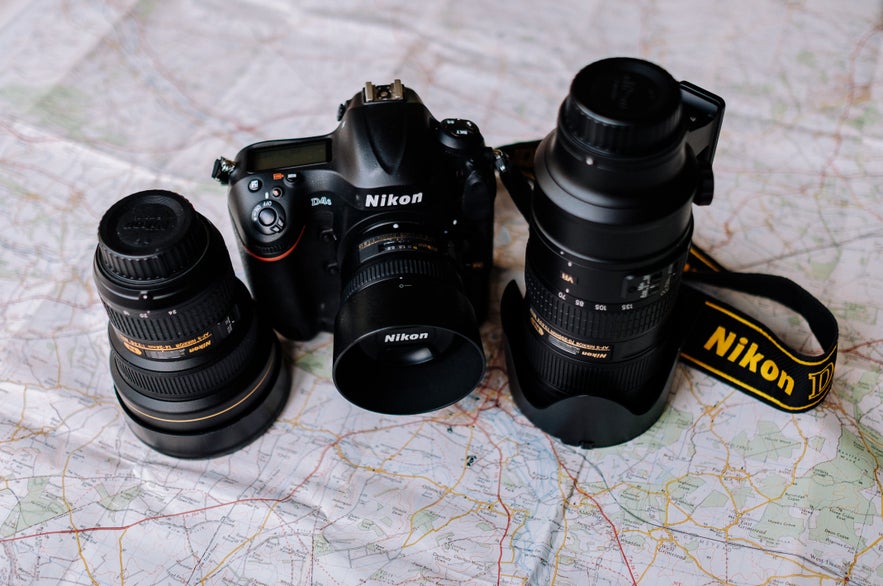 Nikon is the older of the two brands. Photo by: 'Unsplash'.
Nikon is the older of the two brands. Photo by: 'Unsplash'.
Canon instead was born a few decades later in 1937, with the aim of replicating the fabulous and expensive Leica cameras at a more convenient price. At that time, they weren’t able to produce lenses, so they had to adapt their cameras to work with Nikon (also known as 'Nikkor') lenses.
Nikon was the top choice for professional photographers until the early 90s, when Canon came out with the EF mount. This new system was designed from scratch and not just a re-adaptation like the F-mount with autofocus. It worked a lot better than other lenses at the time, or at least well enough to make many professional photographers decide to switch brands. By the early 2000s though, Nikon was once again on top in terms of sales and things stayed like that until the end of the decade, when Canon introduced a number of innovations into their products right when Nikon wasn’t improving their cameras at the same pace.
These days, the competition between the two brands is very tight but Nikon is slightly ahead due to the great quality of their camera sensors.
Comparison of Canon and Nikon Camera Systems
In this section, we’ll examine each of the characteristic features of the cameras and lenses that define the two brands and try to figure out which one is currently offering the best pieces of gear. For the sake of the article, we won’t focus on specific cameras or lenses but we’ll take a look at the bigger picture and focus on the highlights that both Nikon and Canon have incorporated into their products.
 Is Canon or Nikon right for you? Photo by: 'Unsplash'.
Is Canon or Nikon right for you? Photo by: 'Unsplash'.
System Compatibility
Both manufacturers have their own mounting system for their cameras. Since 1959, Nikon has been using the well-known 'F-mount' on all of their reflex cameras. More recently, they came out with a completely new mount for their mirrorless cameras, the so-called 'Z-mount'.
In 1987, Canon introduced its famous 'EF-mount' for reflex cameras, which was designed from scratch to work with the autofocus motor. Their most recent creation was the 'RF-mount', which was specifically designed for their mirrorless camera system.
Proprietary lenses are not the only ones that you can mount on your cameras though, as many other brands are currently producing lenses for both Nikon and Canon. A few examples include Sigma, Tamron, Tokina and Samyang.
Honestly, there’s absolutely no difference on system compatibility between Canon and Nikon: both brands have a huge line-up of lenses and will work with pretty much all of the third party lenses available on the market.
Performance
Not surprisingly, performance is one of the most important features when it comes to photographic cameras, with a special regard to the image quality. Some of the main ways to understand how a camera will perform is by observing which processor it has, which autofocus motor it is using and – most importantly – what image sensor it is mounting.
Don’t be fooled by the number of megapixels, since they don’t mean anything in terms of image quality. All they measure is the size that your pictures will be when they come out of your camera and nothing more than that.
The image sensor is the most important part of the camera when it comes to dynamic range, ISO capabilities and image quality. In general, it is the first thing you should look at when you start doing some research into a new camera. In the last few years, Nikon has managed to stay a bit ahead of Canon in terms of image sensors, since they were the first to come out with the so-called “big megapixel cameras”. These cameras utilised sensors made by Sony, which were (and are) some of the best on the digital camera market. For example, the popular Nikon D800 / D800E / D810 cameras, which have been a huge success for the manufacturer, all use Sony sensors.
Features
Now it’s time to dig a little bit further into the single specifications of both Nikon and Canon cameras to see where one rates higher than the other!
LCD: Colour Shifts, Quality and Brightness
I’ll cut it short for you: Canon is currently the leader when it comes to LCD camera screens. It begins with the fact that Canon has been using the auto-brightness function for a while now on all of its LCD screens, while Nikon didn't even consider incorporating it as a feature until a couple of years ago.
Canon screens also appear to have a more natural and accurate colour representation when compared to the slightly green-ish tones of Nikon. Canon also performs better in terms of overall quality of image resolution. As such, Canon definitely wins the battle of the best LCD screens on modern cameras!
Video
Even though most of you probably don't consider video capabilities as a core feature of your camera, it’s nice to know that you can actually create some incredible videos with it in case you start to get passionate about filming and not just photography, right?
Until a few years ago, there was no fight. Canon had far more experience in the cinema sector and was years ahead of Nikon in terms of video capabilities on their cameras. These days, that difference between the two brands has thinned to the point where Nikon has implemented more (and better) features compared to Canon, particularly with their recent full frame mirrorless cameras – the Nikon Z6 and Z7. With these cameras, you can utilise the entire sensor to record videos. Meanwhile, Canon users have to settle for videography using just a cropped part of the sensor.
Flash Control
Both Canon and Nikon cameras are equivalent in terms of flash control. You’ll struggle to see any real differences between the two brands. Nikon used to be ahead back in the day but right now, they are at the same level.
 Both Nikon and Canon have great flash control. Photo by: 'Unsplash'.
Both Nikon and Canon have great flash control. Photo by: 'Unsplash'.
Flicker Shoot-Through
If you ever try to shoot sport pictures indoors, then you’ll notice that the colours and exposure will change quite dramatically. This is because the lighting of the stadium, arena or building will usually be flickering. You won’t be able to see it since it happens really quickly but your camera certainly will.
 It's a different kettle of fish when you need to shoot sports. Photo by: 'Unsplash'.
It's a different kettle of fish when you need to shoot sports. Photo by: 'Unsplash'.
In their most recent cameras, Canon has introduced a mechanism that identifies this type of flicker and automatically delays the shot by a few milliseconds in order to achieve the correct exposure. As such, if you'll be shooting in a lot of indoor or low-light sporting situations, then Canon is the way to go!
Weather Sealing
If you have plans to shoot a lot outside in harsh weather conditions, then you'd better look for a weather-sealed camera. In order to find one of those, you’ll generally have to look towards the higher end of the brand lineup due to the expenses involved in creating cameras with more durable materials.
 You'll need a weather-sealed camera to shoot in conditions like this. Photo by: 'Leonardo Papèra'.
You'll need a weather-sealed camera to shoot in conditions like this. Photo by: 'Leonardo Papèra'.
Both Canon and Nikon produce weather-sealed cameras that will resist some of the worst conditions that Mother Nature can throw at you, so there's not really any difference between the two!
- See also: How to Take Great Photos in Bad Weather
Usability
Usability should cover a fundamentally large part of your decisional process: remember that your camera should be an “extension” of your arm, not just a tool. You should be able to work with it without even opening your eyes, otherwise you might miss a lot of shots!
Ergonomics
There’s no way to tell you in advance which one has the best ergonomics. The only way to know is by personally testing both to see which system will fit your hands better. For me, it was Nikon. For you, it might be Canon. There isn't a brand that prevails here. The only solution is to try holding cameras from both manufacturers to see which one “feels right” for you.
Quick Control Screen
Over the years, I have tried using both Canon and Nikon control screens. Even though I am more used to the Nikon control screen, I have to admit that Canon screens are great too! If you're starting from scratch, then you will probably find the Canon quick control screen to be more intuitive than the Nikon one.
- See also: Best Cameras for Beginners in 2020
Battery Chargers
Canon chargers will show you a rough estimate of the percentage of battery that has charged while it is charging (one blink until 50%, two blinks from 50% to 75%, three blinks from 75% to 99% and then green when it’s ready). On the other hand, Nikon chargers just blink for the entire charging time and stop blinking when the battery is ready.
Depending on how well you can handle this minor but significant difference, it may or may not be a dealbreaker in terms of which brand you choose.
 Both Canon and Nikon have different types of battery chargers. Photo by: 'Unsplash'.
Both Canon and Nikon have different types of battery chargers. Photo by: 'Unsplash'.
Lenses
Before we start to talk about lenses, it is important to understand that both manufacturers produce some incredibly sharp lenses. The lineup of lenses from both Canon and Nikon answer to all different kinds of needs. If you already possess a Nikon or Canon body, then I’m sure you’ll find a lens for your requirements without having to jump ship!
Wide Angles
Nikon's most popular wide angle lens is the AF-S 14-24mm f/2.8 for their DSLR lineup. The problem is that the lens has been on the market for almost 15 years now and is starting to show its age, especially when used with the most recent big megapixel cameras.
Meanwhile, Canon has continued updating its popular 16-35mm f/2.8 lens, which is now at its third evolution. They also came out with the extreme 11-24mm f/4 lens a few years ago.
If you are looking for a wide angle that will also allow you to shoot at night, then the Nikon is the best choice. However, if you are more keen on having the latest in wide angle technology, then Canon certainly delivers!
Standard Zoom Lenses
Both Nikon and Canon produce excellent lenses in this focal range, starting with the incredibly good 24-70mm f/2.8 and f/4, to prime lenses such as the 24mm, 35mm, 50mm or 85mm. These are available in bright apertures like f/1.8 and f/1.4. I’d honestly call it a tie here.
Telephoto Lenses
Let me start by saying that both Nikon and Canon have excellent versions of the classic 70-200mm lens, available in apertures of f/2.8 and f/4. They also both have the classic 70-300mm.
 You'll need a great telephoto lens to shoot wildlife. Photo by: 'Leonardo Papèra'.
You'll need a great telephoto lens to shoot wildlife. Photo by: 'Leonardo Papèra'.
Until a few years ago, Canon was on top due to the fantastic 100-400mm lens which they had in their lineup in tandem with some of the sharpest telephoto prime lenses the world has ever seen, including the 500mm f/4, 400mm f/2.8 and 600mm f/4. These days, Canon remains slightly ahead in the telephoto game, though the gap has certainly become thinner. Nikon has released the great 200-500mm f/5.6 lens and a new version of their dated 80-400mm. Let’s just say that if you have a Nikon camera, you won’t struggle to find a great telephoto lens for your needs!
Customer Support
It’s known that Canon has some of the best technical support and customer service in the photography world. That doesn’t mean that Nikon customer service is bad, it’s just not at the same level of Canon. However, both services are great and will fix your problems right away. With Canon, it might be faster and easier but Nikon will also take care of any issues that you may have.
 Nikon customer support may not be as good as Canon's but they'll still give you their best! Photo by: 'Unsplash'.
Nikon customer support may not be as good as Canon's but they'll still give you their best! Photo by: 'Unsplash'.
Price
If you compare similar models of cameras or lenses between the two brands, then you’ll notice that there isn’t much of a difference in terms of price tag. With some products, you’ll find Nikon to be a bit more expensive, whereas with others, Canon will be the more expensive choice. It generally depends on the age of the product – is it new or just released? Is it dated or going out of production? Popularity also plays a huge factor in pricing!
 Canon and Nikon level out in terms of price across their range. Photo by: 'Unsplash'.
Canon and Nikon level out in terms of price across their range. Photo by: 'Unsplash'.
Canon vs. Nikon: Which Brand is Right for You?
Now that we’ve compared the most important aspects and features that you should pay attention to when deciding which brand to choose (or if it’s worth to switch brand), it’s time to sum up.
I’m not in the position to give you a final, unequivocal answer to the question of which one is better. You should think about what the most important aspects are for you and then decide which brand offers the most specifications in terms of those particular characteristics. For example, if pure image quality is what you are seeking, then Nikon cameras are better. However, if you want to get the best possible assistance in case something goes wrong, then Canon might be a better choice. If you prefer to shoot sports, action and wildlife, then you will likely need a good range of telephoto lenses. This means that you should probably go with Canon. If instead you are more into landscapes, architecture and travel photography, then Nikon could be a better choice.
 Which brand you choose will depend on your needs. Photo by: 'Unsplash'.
Which brand you choose will depend on your needs. Photo by: 'Unsplash'.
The brand that will be right for you depends largely upon what you want from it. No matter which system you choose to go with and the reasoning behind it, there will always be another photographer out there who thinks differently!
Conclusion
You've probably already heard this a hundred times but just in case you haven’t: it’s not the gear that will make you capture great pictures. Having great camera equipment may help you immensely but in the end, it will be up to you and your skills to catch the right moment, the right composition and the right subject.
It’s good to have an idea about what equipment you want and need but don’t focus too much on the Canon vs Nikon debate. Rather, you would be better off spend more time learning about how to use your camera settings, photographic techniques, composition and of course, getting out there to shoot!
About the author: Leonardo Papèra is a landscape photographer based in Italy. You can find more of his work on his website or by following him on Facebook and Instagram.
Have you already invested in a great camera? What criterion did you need to fulfil when you were camera shopping for a particular system or brand? Share your thoughts by leaving a comment below!

